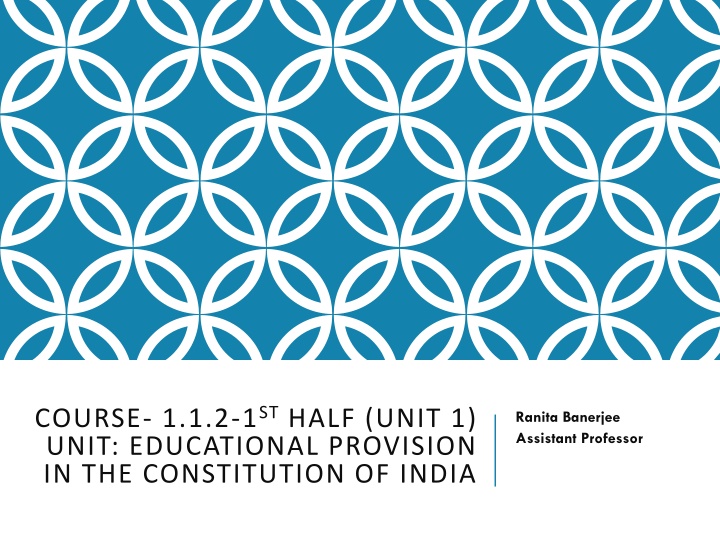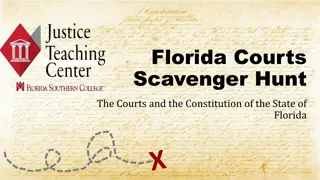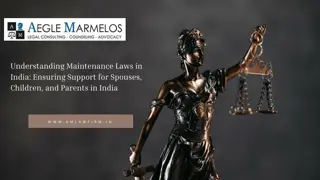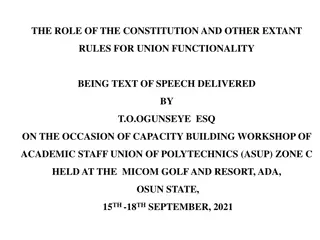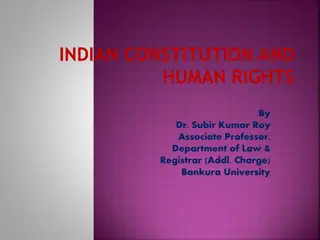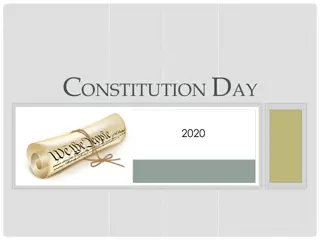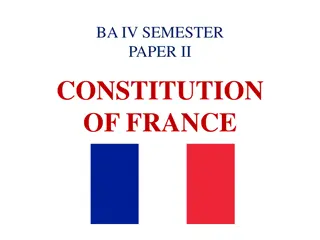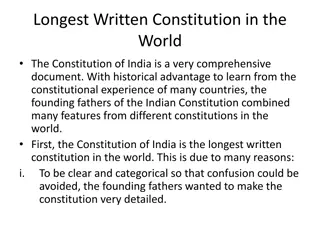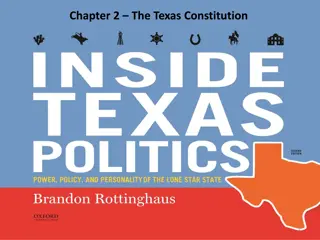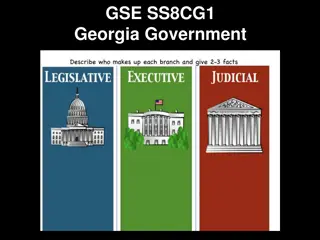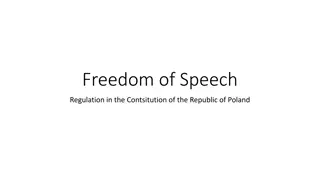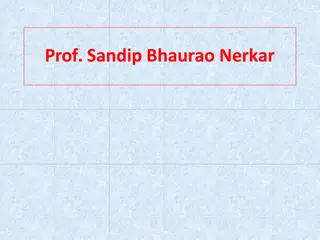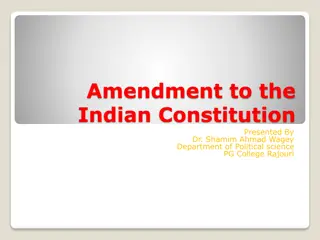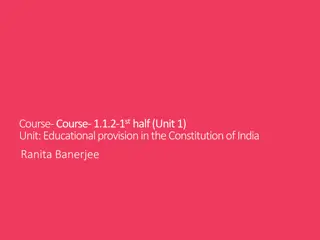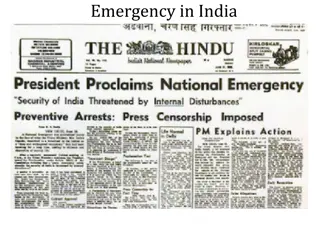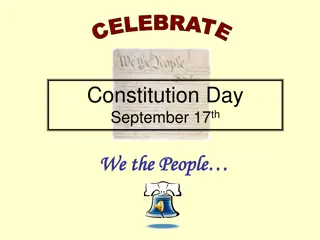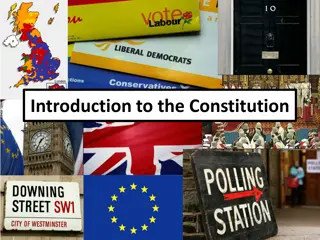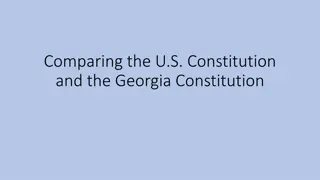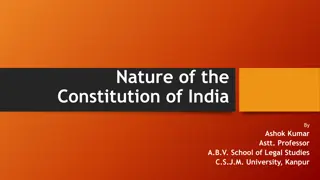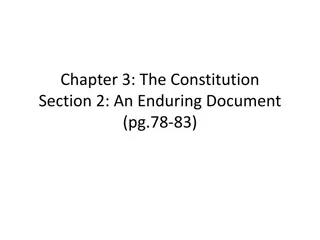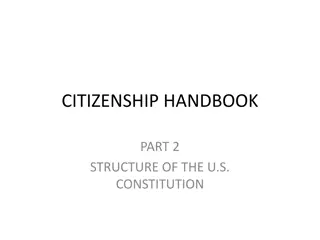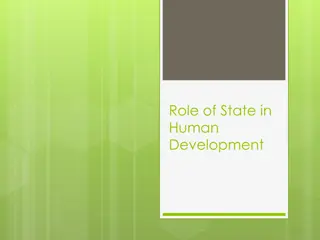Educational Provisions in the Constitution of India
The Constitution of India, adopted in 1949, serves as the supreme law outlining the fundamental structure, government institutions, rights, duties of citizens, and more. It emphasizes sovereignty, socialism, and secularism, establishing India as an independent, democratic, and inclusive nation.
Download Presentation

Please find below an Image/Link to download the presentation.
The content on the website is provided AS IS for your information and personal use only. It may not be sold, licensed, or shared on other websites without obtaining consent from the author.If you encounter any issues during the download, it is possible that the publisher has removed the file from their server.
You are allowed to download the files provided on this website for personal or commercial use, subject to the condition that they are used lawfully. All files are the property of their respective owners.
The content on the website is provided AS IS for your information and personal use only. It may not be sold, licensed, or shared on other websites without obtaining consent from the author.
E N D
Presentation Transcript
COURSE- 1.1.2-1STHALF (UNIT 1) UNIT: EDUCATIONAL PROVISION IN THE CONSTITUTION OF INDIA Ranita Banerjee Assistant Professor
The Constitution of India is the supreme law of India. The Constitution provides the framework demarcating fundamental structure, procedures, powers, and duties of government institutions fundamental rights, directive principles, and the duties of citizens. Indian Constitution is the longest written constitution in the world. B. R. Ambedkar, chairman of the drafting committee, and was the main mind behind it s creation. political code, and puts forth
IT WAS ADOPTED BY THE CONSTITUENT ASSEMBLY OF INDIA ON 26 NOVEMBER 1949 AND BECAME EFFECTIVE ON 26 JANUARY 1950
SOVEREIGN This word implies that India is neither a dependence nor a dominion of any other nation but an independent country. There is no authority above it, and it is free to conduct its own affairs, both internal and external. Being a sovereign state, India can either acquire a foreign territory or cede a part of its territory in favour of a foreign state.
SOCIALIST:- Even before the term was added by the 42nd Amendment in 1976, the Constitution had a socialist content in the form of certain Directive Principles of State Policy. The Indian brand of socialism is a 'democratic socialism' and not a 'communistic socialism' (also known as 'state socialism') which involves the nationalisation of all means of production and distribution and the abolition of private property. Democratic socialism, on the other hand, holds faith in a 'mixed economy' where both public and private sectors co-exist side by side'. As the Supreme Court says, 'Democratic socialism aims to end poverty, ignorance, disease and inequality of opportunity.
SECULAR The term 'secular' too was added by the 42nd Constitutional Amendment Act of 1976. However, as the Supreme Court said in 1974, although words 'secular state' is not mentioned in the Constitution, there can be no doubt that Constitution-makers wanted to establish such a state and accordingly Articles 25 to 28 (guaranteeing the fundamental rights to freedom of religion) have been included in the constitution. The Indian Constitution embodies the positive concept of secularism i.e., all religions in our country (irrespective of their strength) have the same status and support from the state.
DEMOCRATIC The Indian Constitution provides for representative parliamentary democracy under which the executive is responsible to the legislature for all its policies and actions. Universal adult franchise, periodic elections, rule of law, independence of judiciary, and absence of discrimination on certain grounds are the manifestations of the democratic character of the Indian polity. The term 'democratic' is used in the Preamble in the broader sense embracing not only political democracy but also social and economic democracy.
REPUBLIC A democratic polity can be classified into two categories monarchy and republic. In a monarchy, the head of the state (usually king or queen) enjoys a hereditary position, that is, he comes into office through succession, eg, Britain. In a republic, on the other hand, the head of the state is always elected directly or indirectly for a fixed period, eg, USA. Therefore, the term 'republic' in our Preamble indicates that India has an elected head called the president. He is elected indirectly for a fixed period of five years.
DEMOCRATIC & REPUBLIC The major difference between a democracy and a republic is that a republic is a form of government whereas a democracy is an ideology that helps shape how a government is run. Put another way: a republic is the system of government that allows a country to be democratic.
JUSTICE The term 'justice' in the Preamble embraces three distinct forms social, economic and political, secured through various provisions of Fundamental Rights and Directive Principles. Social justice denotes the equal treatment of all citizens without any social distinction based on caste, colour, race, religion, sex and so on. It means absence of privileges being extended to any particular section of the society, and improvement in the conditions of backward classes (SCs, STs and OBCs) and women.
LIBERTY The term 'liberty' means the absence of restraints on the activities of individuals, and at the same time, providing opportunities for the development of individual personalities. The Preamble secures to all citizens of India liberty of thought, expression, belief, faith and worship, through their Fundamental Rights, enforceable in court of law, in case of violation. Liberty as elaborated in the Preamble is very essential for the successful functioning of the Indian democratic system. However, liberty does not mean `license' to do what one likes, and has to be enjoyed within the limitations mentioned in the Constitution itself. In brief, the liberty conceived by the Preamble or fundamental rights is not absolute but qualified.
EQUALITY The term 'equality' means the absence of special privileges to any section of the society, and the pro-vision of adequate opportunities for all individuals without any discrimination. The Preamble secures to all citizens of India equality of status and opportunity. This provision embraces three dimensions of equality civic, political and economic.
FRATERNITY Fraternity means a sense of brotherhood. The constitution promotes this felling of fraternity by the system of single citizenship. Also, the Fundamental Duties (Articles 51-A) say that is shall be the duty of every citizen of India to promote harmony and the spirit of common brotherhood amongst all the people of India transcending religious, linguistic, regional or sectional diversities. The Preamble declares that fraternity has to assure two things the dignity of the individual and the unity and integrity of the nation. The word integrity has been added to the preamble by the 42nd Constitutional Amendment (1976).
SIGNIFICANCE OF THE PREAMBLE The preamble embodies the basic philosophy and fundamental values: political, moral and religious- on which the constitution is based. It contains the grand and noble vision of the constituent assembly, and reflects the dreams and aspirations of the founding fathers of the constitution.
FUNDAMENTAL RIGHTS Fundamental rights are those rights which are essential for intellectual, moral and spiritual development of citizens of India. As these rights are fundamental or essential for existence and all-round development of individuals, they are called 'Fundamental rights'. These are enshrined in Part III (Articles 12 to 35) of the Constitution of India. These include individual rights common to most, such as equality before the law, freedom of speech and freedom of expression, religious and cultural freedom, Freedom of assembly (peaceful assembly), freedom of religion (freedom to practice religion), right to constitutional remedies for the protection of civil rights (the rights of citizens to political and social freedom and equality).
FUNDAMENTAL RIGHTS Fundamental rights apply universally to all citizens, irrespective of race, birthplace, religion, caste, sexual orientation, gender or gender identity. The Indian Penal Code, Code of Criminal Procedure and other laws prescribe punishments for the violation of these rights, subject to the discretion of the judiciary. Though the rights conferred by the constitution other than fundamental rights are also valid rights protected by the judiciary, in case of fundamental rights violations, the Supreme Court of India can be approached directly for ultimate justice as per Article 32. The Rights have their origins in many sources, including England s Bill of Rights, the United States Bill of Rights and France s Declaration of the Rights of Man.
FUNDAMENTAL RIGHTS Right to Equality Right to Equality Right to Freedom Right to Freedom Right Against Exploitation Right Against Exploitation Right to Freedom of Religion Right to Freedom of Religion Cultural and Educational Rights Cultural and Educational Rights Right to Constitutional Remedies Right to Constitutional Remedies Right to Education Right to Education
RIGHT TO EQUALITY RIGHT TO EQUALITY Articles. 14-18 The right to equality includes equality before the law, the prohibition of discrimination on grounds of religion, race, caste, sexual orientation, gender or gender identity and/or place of birth, equality of opportunity in matters of employment, the abolition of untouchability and abolition of titles.
Article 14Article 14 represents the idea of equality, which states that the state shall not deny to any person equality before the law or the equal protection of the laws within the territory of India. The equality before the law is guaranteed to all without regard to race, colour, or nationality.
Article 15 Non-discrimination on grounds of religion, race, caste, sex, or place of birth Article 15 states that the state shall not discriminate against any citizen on grounds only of religion, caste, sex, place of birth, or any of them and would not be subject to any disability, liability, restriction, or condition. Nothing in this article shall prevent the state from making any special provisions for women and children. Nothing in this article or in sub-clause (G) of clause (1) of Article 19 shall prevent the state from making any special provision by law, for the advancement of any socially and educationally backward classes of citizens or for the Scheduled Castes or Scheduled Tribes.
Equality of opportunity in public employment Article 16 Article 16 states that no citizen shall on grounds only of religion, race, caste, sex, descent, place of birth, residence, or any of them, be ineligible for or discriminated against in respect of any employment or office under the state. It empowers Parliament to make a law prescribing any requirement as to residence within that state or UT prior to employment or appointment in that state or UT. It empowers the state to make special provisions for the reservation of appointments or posts in favour of any backward classes of citizens. It guarantees that the State cannot discriminate against a citizen in the matters of employment. However, the state can make reservations for the SC/ST/OBC category of candidates in public employment.
Article 17 Article 17 Abolition of Untouchability Article 17 abolishes Untouchability and forbids its practice in any form. Untouchability refers to a social practice that looks down upon certain oppressed classes solely on account of their birth and makes any discrimination against them on this ground. (Article 18): Abolition of Titles Article 18 abolishes all titles and prohibits the state to confer titles on anybody whether a citizen or a non-citizen. However, military and academic distinctions are exempted from the prohibition.
Article 18 It prohibits the State from conferring any titles. Citizens of India cannot accept titles from a foreign State. The British government had created an aristocratic class known as Rai Bahadurs and Khan Bahadurs in India these titles were also abolished. However, Military and academic distinctions can be conferred on the citizens of India. The awards of Bharat Ratna and Padma Vibhushan cannot be used by the recipient as a title and do not, accordingly, come within the constitutional prohibition .
RIGHT TO FREEDOM RIGHT TO FREEDOM Articles. 19-22 The right to freedom includes freedom of speech and expression, assembly, association or union or cooperatives, movement, residence, and right to practice any profession or occupation.
Article 19 Right to Freedom : The Right to Freedom guarantees to the citizens of India six Fundamental Freedoms: 1) Freedom of Speech and Expression, 2) Freedom of Assembly, 3) Freedom to form associations, 4) Freedom of Movement, 5) Freedom to reside and to settle, and 6) Freedom of profession, occupation, trade, or business. .
Article 20Protection in respect of Conviction for Offences Article 20 provides protection against arbitrary and excessive punishment for any person who commits an offense. This article has taken care to safeguard the rights of persons accused of crimes. Moreover, this article cannot be suspended even during an emergency in operation under Article 359. It gives protection in respect of conviction for offences
Article 21 Protection of Life and Personal Liberty Article 21 states no person shall be deprived of his life or personal liberty except according to the procedure established by law. However, Article 21 puts a limit on the power of the State given under Article 246, read with the legislative lists. Thus, Article 21 does not recognise the Right to Life and Personal Liberty as an absolute right but limits the scope of the right itself. It gives the right to life, personal liberty and the right to die with dignity (passive euthanasia). Thus, Article 21 does not recognise the Right to Life and Personal Liberty as an absolute right but limits the cope of the right itself.
Article 22 Safeguards against Arbitrary Arrest and Detention Firstly, it gives the right of every person who is arrested to be informed of the cause of his arrest; secondly, his right to consult and to be defended by a lawyer of his choice. Thirdly, every person arrested and detained in custody shall be produced before the nearest Magistrate within a period of twenty-four hours and shall be kept in continued custody only with his authority.
RIGHT AGAINST EXPLOITATION RIGHT AGAINST EXPLOITATION (Articles. 23-24) The right against exploitation prohibits all forms of forced labour, child labour and trafficking of human beings. Children under age of 14 are not allowed to work.
Article 23 It prohibits traffic in human beings, women, children, beggars or other forced labor militate against human dignity. Article 24 It prohibits employing children below the age of 14 years in any hazardous job.
RIGHT TO FREEDOM OF RELIGION RIGHT TO FREEDOM OF RELIGION Articles. 25-28 The right to freedom of religion includes freedom of conscience and free profession, practice, and propagation of religion, freedom to manage religious affairs, freedom from certain taxes and freedom from religious instructions in certain educational institutes.
Article 25 It offers freedom of Conscience and Free Profession, Practice and Propagation of Religion Article 26 It helps to manage religious affairs, which is subject to public order, morality and health, every religious denomination or any section. Article 27 It provides freedom not to pay taxes for religious expenses on the promotion or maintenance of any particular religion. Article 28 It prohibits religious instructions in educational institutions wholly maintained by the state.
CULTURAL AND EDUCATIONAL CULTURAL AND EDUCATIONAL RIGHTS RIGHTS Articles. 29-30 The Cultural and educational Rights preserve the right of any section of citizens to conserve their culture, language or script, and right of minorities to establish and administer educational institutions of their choice.
Article 29 It provides protection of the interests of minorities. A minority community can effectively conserve its language, script, or culture by and through an educational institution. Article 30 It states the rights of minorities whether based on religion or language to establish and administer educational institutions.
RIGHT TO RIGHT TO CONSTITUTIONAL CONSTITUTIONAL REMEDIES REMEDIES Articles. 32-35 The right to constitutional remedies is present for enforcement of fundamental rights.
Article 32 It provides the right to Constitutional remedies which means that a person has the right to move to the Supreme Court or the high courts to protect his/her fundamental rights. While the Supreme Court has the power to issue writs under Article 32, High Courts have been given same powers under article 226. According to B.R. Ambedkar, it is the heart and soul of the Indian constitution
Article 33 It empowers the Parliament to modify the application of Fundamental Rights to the armed forces or forces charged with the maintenance of public order. Article 35 Parliament shall have, and the Legislature of a State shall not have, the power to make laws
Article 34 Notwithstanding anything in the foregoing provisions of this Part, Parliament may by law indemnify any person in the service of the Union or of a State or any person in respect of any act done by him in connection with the maintenance or restoration or order in any area within the territory of India where martial law was in force or validate any sentence passed, the punishment inflicted, forfeiture ordered or other act done under martial law in such area.
RIGHT TO EDUCATION RIGHT TO EDUCATION Article 21A The Constitution (Eighty- sixth Amendment) Act, 2002 inserted Article 21-A in the Constitution of India to provide free and compulsory education of all children in the age group of six to fourteen years as a Fundamental Right in such a manner as the State may, by law, determine.
https://testbook.com/blog/fundamental-rights-in-india-gk-notes/https://testbook.com/blog/fundamental-rights-in-india-gk-notes/
